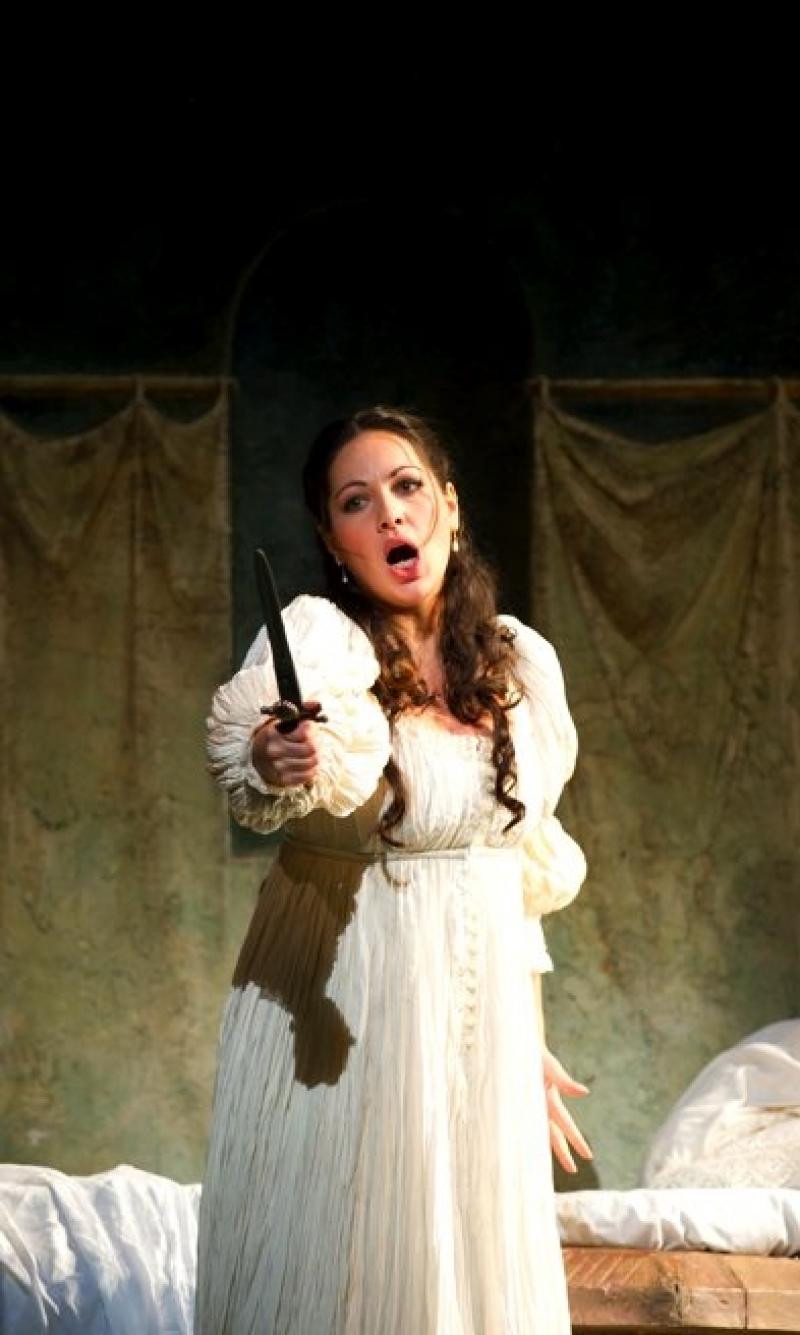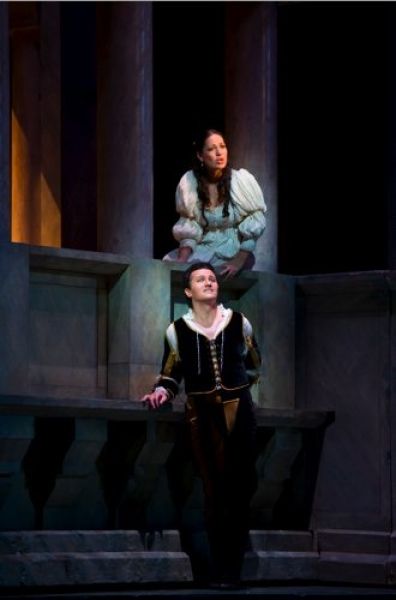Roméo et Juliette, Royal Opera | reviews, news & interviews
Roméo et Juliette, Royal Opera
Roméo et Juliette, Royal Opera
Leads don't quite do justice to Gounod's appealing adaptation

We sophisticates aren't really meant to enjoy Gounod. His simple 19th-century brew - five parts sentimentality, one part religiosity - isn't supposed to wash with modern palettes that crave layers of meaning, irony and social context. The ENO's solution last month was to present a version of Gounod's Faust that had these elements filled in. It flopped.
The answer to this was always going to lie with the success (or failure) of the leading couple as a couple. It may seem an obvious point but, more than any other adaptation, Gounod's Roméo et Juliette is about Roméo-and-Juliette as a unit: their united nerves, their united love, their united anguish. There is little by way of relief: few crowd scenes, little feeling of social pressure, few differentiating soliloquys. And the structural foundations of the opera reflect this. Four mammoth duets are the pillars on which the work is built. Little else gets in the way of the lovebirds.
The set (Carlo Tommasi), made up of medieval Romanesque constructions that increased in handsomeness as the evening went on, wasn't ever going to carry the show, however much I wanted to take home Friar Lawrence's (Frère Laurent's) wood-panelled transept and Juliette's little walled bed. And there are virtually no other vocal roles to divert attention from the leads, except for that of the Frère, delivered with meaty phlegmatism by Vitalij Kowaljow, and one pretty aria from Stéphano, Romeo's page, which fizzed in the hands of Ketevan Kemoklidze.
The spotlight was on Nino Machaidze's Juliette and Piotr Beczala's Roméo. And at first it seemed it might be a little too revealing. Kemoklidze's Georgian compatriot, Machaidze (had there been a special offer on Georgian vocalists?) was a bag of nerves. At least that's how I explained the unruliness of her voice at the start. She was sharp throughout the first two, maybe even three, acts and, though she was hitting the money notes, they were messy, unpleasantly harsh stabs at the bullseye.
 But as Juliette relaxes into love, so did Machaidze. Her voice lost its harshness, gained a sweetness, found a backbone, unearthed some musicality and calmed its vibrato (which was to blame for much of the tunelessness). There were still problems: a lack of dynamic range, in particular. But if and when she finds her sotto voce, she will become quite a formidable package, for she has a natural and alluring presence on stage. Indeed, when accompanied by that sultry, almost Iberian, passage of musical see-sawing that seems to herald Juliette's bout of intermittent delirium, she's quite the chica.
But as Juliette relaxes into love, so did Machaidze. Her voice lost its harshness, gained a sweetness, found a backbone, unearthed some musicality and calmed its vibrato (which was to blame for much of the tunelessness). There were still problems: a lack of dynamic range, in particular. But if and when she finds her sotto voce, she will become quite a formidable package, for she has a natural and alluring presence on stage. Indeed, when accompanied by that sultry, almost Iberian, passage of musical see-sawing that seems to herald Juliette's bout of intermittent delirium, she's quite the chica.
Beczala's Roméo (pictured right with Juliette) travelled the reverse journey. He began with some very convincing vocal feats and ended in a strained, throaty fashion. Still, he navigated the relationship well enough over the course of the four duets. He shook off a naff, crooning Anton du Beke quality that was fleetingly present at the start. And as he flowered in character, Machaidze in voice, one almost got to a believable couple. How doubly sad then to see the lovers succumb to their fate. A little longer together and Beczala and Machaidze might have started to generate some fizz, too.
Thank God then for conductor Daniel Oren. The only way to deal with a score that is so economical (yet nifty) in its harmonising, so lavish in its melodising, so long-limbed in its phrasing, is to throw everything at it. The returns are mighty if you do. And Oren did. The death of Tybalt (a disappointing Alfie Boe, ever the lightweight) at the end of Act Three, heaving with Tchaikovskian menace, was a highlight. Here, as the two houses face off, emotions seemed to roll in like the lapping of a disturbed sea.
One left with huge admiration for Gounod - how attractive and deceptively clever the score, how clear the drama, how honest the sentiments - and little regard for our generation. What a self-important bunch we are to have so mean-spiritedly and wrong-headedly cast him aside in recent decades. It's been 10 years since the last production of this opera at the Royal Opera House. Let's hope we don't have to wait for as long for another bite of the cherry. Let the Gounod revival begin!
- Roméo et Juliette is on at the Royal Opera House until 3 December
- See what's on at the Royal Opera in 2010-11
- 'Romeo and Juliet in Opera and Ballet': a survey on theartsdesk
Explore topics
Share this article
Add comment
The future of Arts Journalism
You can stop theartsdesk.com closing!
We urgently need financing to survive. Our fundraising drive has thus far raised £49,000 but we need to reach £100,000 or we will be forced to close. Please contribute here: https://gofund.me/c3f6033d
And if you can forward this information to anyone who might assist, we’d be grateful.

Subscribe to theartsdesk.com
Thank you for continuing to read our work on theartsdesk.com. For unlimited access to every article in its entirety, including our archive of more than 15,000 pieces, we're asking for £5 per month or £40 per year. We feel it's a very good deal, and hope you do too.
To take a subscription now simply click here.
And if you're looking for that extra gift for a friend or family member, why not treat them to a theartsdesk.com gift subscription?
more Opera
 La bohème, Opera North review - still young at 32
Love and separation, ecstasy and heartbreak, in masterfully updated Puccini
La bohème, Opera North review - still young at 32
Love and separation, ecstasy and heartbreak, in masterfully updated Puccini
 Albert Herring, English National Opera review - a great comedy with depths fully realised
Britten’s delight was never made for the Coliseum, but it works on its first outing there
Albert Herring, English National Opera review - a great comedy with depths fully realised
Britten’s delight was never made for the Coliseum, but it works on its first outing there
 Carmen, English National Opera review - not quite dangerous
Hopes for Niamh O’Sullivan only partly fulfilled, though much good singing throughout
Carmen, English National Opera review - not quite dangerous
Hopes for Niamh O’Sullivan only partly fulfilled, though much good singing throughout
 Giustino, Linbury Theatre review - a stylish account of a slight opera
Gods, mortals and monsters do battle in Handel's charming drama
Giustino, Linbury Theatre review - a stylish account of a slight opera
Gods, mortals and monsters do battle in Handel's charming drama
 Susanna, Opera North review - hybrid staging of a Handel oratorio
Dance and signing complement outstanding singing in a story of virtue rewarded
Susanna, Opera North review - hybrid staging of a Handel oratorio
Dance and signing complement outstanding singing in a story of virtue rewarded
 Ariodante, Opéra Garnier, Paris review - a blast of Baroque beauty
A near-perfect night at the opera
Ariodante, Opéra Garnier, Paris review - a blast of Baroque beauty
A near-perfect night at the opera
 Cinderella/La Cenerentola, English National Opera review - the truth behind the tinsel
Appealing performances cut through hyperactive stagecraft
Cinderella/La Cenerentola, English National Opera review - the truth behind the tinsel
Appealing performances cut through hyperactive stagecraft
 Tosca, Royal Opera review - Ailyn Pérez steps in as the most vivid of divas
Jakub Hrůša’s multicoloured Puccini last night found a soprano to match
Tosca, Royal Opera review - Ailyn Pérez steps in as the most vivid of divas
Jakub Hrůša’s multicoloured Puccini last night found a soprano to match
 Tosca, Welsh National Opera review - a great company reduced to brilliance
The old warhorse made special by the basics
Tosca, Welsh National Opera review - a great company reduced to brilliance
The old warhorse made special by the basics
 BBC Proms: The Marriage of Figaro, Glyndebourne Festival review - merriment and menace
Strong Proms transfer for a robust and affecting show
BBC Proms: The Marriage of Figaro, Glyndebourne Festival review - merriment and menace
Strong Proms transfer for a robust and affecting show
 BBC Proms: Suor Angelica, LSO, Pappano review - earthly passion, heavenly grief
A Sister to remember blesses Puccini's convent tragedy
BBC Proms: Suor Angelica, LSO, Pappano review - earthly passion, heavenly grief
A Sister to remember blesses Puccini's convent tragedy
 Orpheus and Eurydice, Opera Queensland/SCO, Edinburgh International Festival 2025 review - dazzling, but distracting
Eye-popping acrobatics don’t always assist in Gluck’s quest for operatic truth
Orpheus and Eurydice, Opera Queensland/SCO, Edinburgh International Festival 2025 review - dazzling, but distracting
Eye-popping acrobatics don’t always assist in Gluck’s quest for operatic truth

Comments
...
...
...